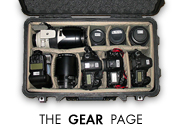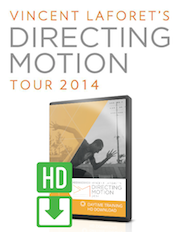Assistants – should you use their photos under your name?

This shot confirming Michael Phelps victory in the 100 M butterfly took years or planning. ©Heinz Kleutmeier and Jeff Kavanaugh/Sports Illustrated
I finally got one of the issues of Sports Illustrated today from the Olympics (a good friend of mine had mailed it to me because I was “lucky” enough to make it into the Leading Off section – no – not a photo that I made, but a photo of me – in the scrum of photographers covering Phelps getting a hug from his mother after the race…) and I saw something extremely refreshing: the credit read: Photo by Heinz Kluetmeier and Jeff Kavanaugh.
Why is that special? Because Jeff is Heinz’s long time assistant and it’s incredibly rare for photographers to give their assistants any credit for the images they take while on assignment with them. I thought this was an incredibly classy move by Heinz and SI. Jeff is also a great guy and deserves the accolade – he was one of the guys I spent more than 13 hours with waiting for the fireworks on the Great Wall and was intricately involved in getting that remote camera working.
“So you mean that even if someone else shoots a picture, as in an assistant, the main photographer generally gets to take credit for the image?” you ask. Traditionally – yes. More on that in a bit.
As it turns out – Jeff was instrumental in making sure the remote worked, working out how to splice the ethernet cable going from his seated position from the side of the blocks, all the way down to the remote underwater camera below. He was able to have the same ethernet cable both trigger the camera – as well as send the images back to his laptop on his lap – LIVE. And yes: he did actually push the button to trigger the camera. And man was the timing perfect – sure he let the camera wail away at 9 frames per second and he and Heinz got the defining image of the Beijing Olympics in my opinion. No other image or clip of video shows as definitively that Phelps won the race – and this is easily one of the most, if not the most – impressive Olympic records of all time. Not too shabby. You can read an interview with Heinz about this image here.
So where does Heinz fit into this? Well actually – he played the key part. I was staying at the same hotel as the SI crew – and I had breakfast with Bob Rosato, another SI staffer, the day after this shot was taken. He told me that Heinz had stated the following to him at breakfast two days prior to the race: if Phelps loses or wins the epic 8 gold-medal record – it will be on the 100M butterfly race – and it will be close. And that’s why Heinz is who he is – and was one of only two people to perfectly position his camera in this position showing both lanes with the #1 and #2 finishers of the race… MASTER. More often than not – great photography is made by people who THINK… (at other times it’s luck, people who just “see” better, or made by people who “feel.” There’s no golden rule or approach.. in fact Henri Cartier-Bresson says the last thing you want to do when making pictures is to “think.”
So it’s only fitting that Heinz gets most of the credit – as truth be told he was one of the first to ever put a remote camera in a pool at the Olympics (he might even be the first – Barcelona if I’m not mistaken – but don’t quote me on that) but I think it’s incredibly classy of him to share credit with his long time assistant.
So back to taking credit for an image that your “assistant” took. It’s actually been pretty common practice throughout photographic history. It’s not uncommon for a photographer to go to a big event, and shoot from one location with his/her assistant(s) shooting from another vantage point. After all – the main photographer can only be at one place at a time – and more specifically with sports, the action is too unpredictable and moves to fast for remote cameras to be effective. If s/he tells the assistant what lens to shoot with, at what settings, where to point the lens, how to frame the shot and when to fire off the frame – one can arguably state that is indeed his/her image…
Legally though – unless the two have a signed contract where the assistant relinquishes all rights to those images to the photographer – that assistant technically owns the copyright btw – or so a series of NYTimes lawyers told me a few years ago. So beware… always have your assistant sign a contract if you’re going to do this – otherwise THEY technically own the image’s copyright… doesn’t matter who’s gear their using, who told them to do what etc.
That being said – I’ve never been a big fan of the practice. It just feels a little icky to me – and that’s just a personal preference of mine – not a judgement on others at all. I have had others helping me at times doing the exact same thing – but I’ve had the following agreement with them: if they are clearly shooting under my specific instructions, the image will run in the publication with my credit (and perhaps theirs if I chose) but that assistant is also free to run the image in their own portfolio with their sole credit underneath it – that feels more fair than most other agreements – and it never hurts to help someone else jump start their careers.
I’m totally expecting to have some people disagree with me on this one (from both sides of the issue)… so go ahead and share you thoughts…













If you didn’t press the shutter, you didn’t shoot the picture, simple.
I understand the premise of setting up a shot and wanting credit – but, especially in sports photography, pictures are about timing as much as anything else. I’m with KGB, “If you didn’t press the shutter, you didn’t shoot the picture, simple.”
Who gets paid for the photo? I guess thats another story. Will Heinz give him a percentage of sales?
KGB’s comment is not quite on target. If I set up the camera on a tripod, set all the camera/lens parameters, and then ask someone to press the button for me once I get in position, I still own the copyright on the picture even though someone else actually pressed the button. In that case, the someone else is simply acting as a remote control.
That very specific edge-case instance aside, I totally agree. How can a photographer claim someone else’s work as their own? Sure, you can give direction as to what you want (shoot from here, try to frame that way), but in the end, the result is up to the skill and luck of the person who actually carries out those instructions.
It may be common practice, but it seems totally slimy to me.
(Vincent, I loved your blog posts throughout the Olympics, whether you wrote them or your assistant 🙂
The timing in this photo, just sayin’, is in the 10 years of prep. Kavanaugh (assistant) wouldn’t have been there without Kleutmeier (photog) knowing / guessing / betting that shot would happen. And knowing the he must shoot from another location that required more than just holding the 9 fps trigger. It’s maybe cropped to only include those two lanes, but however it was done it’s amazing visualization and the photo that captures the capriciousness of the most important moment of the most amazing amazing feat of these games. Bravo to both and bravo to SI for including both names.
Thanks to Vincent and Newsweek for the behind the scenes look too. I love the pictures more than I loved these Games, mostly because of the stories.
I agree with KGB.
I can’t say I would be willing to work as an assistant, no matter who they were or what they told me, if they were to take credit when I pressed the shutter.
Great post Vincent (and what a photo!). I like the way that you allow your assistant to use photos in his / her portfolio with only their credit, but if they took the shot, they should ALWAYS be credited.
Perhaps something like Assistant and LaForet, rather than the other way round. Now that would be classy.
Also, why only credit them sometimes -“the image will run in the publication with my credit (and perhaps theirs if I chose)”?
Best wishes,
Jon
One more thought:
My work is at least equal parts post processing, as planning plus pressing the shutter. Pressing the shutter is easy the least work of them all. I’ve shot aerials of fighter jets, planning and controlling the formation in air over radio, bringing an assistant, who gets similar pictures because of all the above fixed parameters. If I also post process his images, I’ve done most of the work.
Legally, still it’s his images, and I won’t take credit for them or his work. Part of the idea of having an assistant is giving him or her an opportunity to get some help with his/hers career, apart from the education.
Thanks Vince, once again; nice blog.
/Peter
Hi Vincent,
Another interesting blog Vinvent.
I have to admit I wouldn’t feel comfortable claiming credit for a picture I hadn’t taken, it would make me feel like a fraud, if I was the a pro tog and had set the camera up, told them what to look for and what to shoot and when then I beleive a credit of “XYZ in association with XYZ” would be an OK solution, but if the assistant had done all the work I feel it only fair they take the credit.
Just my personal opinion.
Kindest regards
NIGEL (U.K.)
This is a great topic, thanks for posting on it.
Some successful photographers, directors, architects, surgeons, researchers, inventors, etc. will rarely credit the folks who they work with, wanting to use their name alone to push their brand. From one perspective this makes sense and it no doubt helps their brand become more popular (providing they’re good at what they do).
But, other equally successful practitioners of the same trades remain humble and give credit to those who helped, influenced, or supported them. They seem to be just as successful without worrying about name recognition and brand.
In my eyes the latter group are even more successful because they got the shot, made the movie, built the building, etc. while continuing to be generous, supportive, and in some cases, humble.
I don’t look down on successful people who push their names (within reason), but I absolutely look up to successful people who don’t.
It may be the “Main” photographer” that gives the instructions to the asst. as to what lens, etc., to use but it boils down, as always to one single thing, The Eye, brain and Index finger and that belongs to the asst., as in this case. I see no reason why the credit cannot read “Photo by Tom Aellis for Vincent LaForet”
But as you stated, it is only good solid business practice to have a contract signed upon the relationship.
@KGB, Do you think the same thing if a timer is used? or a remote shutter? if it’s the act of pressing the shutter button at the right moment, how about burst mode?
Uh, publishing someone else’s work as your own is plagiarism.
If you have permission, or have contracted for copyright, you may well be able to publish, but doing so as your own is plagiarism, pure and simple.
Note, though, to the “pressing the shutter” crowd, there’s an edge case: if you set up a camera on a tripod, position it, adjust camera settings, then ask someone else to press the button after you get into position, it’s still you who “created the work”, so you still own the copyright (legally under US law, and, I think, morally). That seems to apply to the Phelps photo. If you read the full interview about how it was taken, it appears as if all creative aspects of the shot — from camera position to settings to when to shoot — were decided by the main guy, not the assistant.
In the interview with Richard Deitsch, Kluetmeier says, “Give complete credit to Jeff Kavanaugh.” And yet the photo credits on the website make no mention of Kavanaugh, not does your clip oh the photo credit Kavanaugh. It’s unclear to me why Kavanaugh shouldn’t have sole credit for the photo. He designed the equipment, placed the equipment in the pool, and quite possibly shot the photo. How was Kluetmeier’s role any different than that of an editor on a shoot? Should editor’s get full credits for a photo taken under their direction?
This would seem to be what you advocate. After all, you write, “If s/he tells the assistant what lens to shoot with, at what settings, where to point the lens, how to frame the shot and when to fire off the frame – one can arguably state that is indeed his/her image…” So shouldn’t a photo editor get full credit for a fashion shoot, especially if they are responsible for setting up the lighting, hiring a stylist, etc.?
I think not. I believe photographers who give their assistants such significant latitude to make a photo owe it to their assistants to give them credit when credit is due. For editorial assignments, this means publishing an accurate photo credit.
You also write, “Legally though – unless the two have a signed contract where the assistant relinquishes all rights to those images to the photographer – that assistant technically owns the copyright btw[…]”
It’s possible that Kavanaugh signed a contract directly with Kluetmeier, and who knows what the contact between Kluetmeier and SI looks like these days. However, generally both the photographer and assistant would have signed contracts with Sports Illustrated. I noticed you added the copyright symbol to your photo credit above. I wouldn’t be shocked if Kluetmeier did not own a copyright to the photo. For staff photographers, Sports Illustrated generally owns the copyright to photos taken on assignment. Can you elaborate on where you found the copyright information?
And this leads to an interesting question about the photo. If SI makes a commercial sale of the photo, I believe proceeds from that sale would be shared with Kluetmeier. Would any be shared with Kavanaugh? (Jeff makes a similar point in a comment above.)
There are some photographers who do make sure that their assistants receive credit when they shoot a photo under their tutelage. For example, Rich Clarkson has always been very good about this–I have seen many assignments where the folks he works with are simply called “photographers.” He found a clever way to give both them and him credit; credits shot by photographers who work with him read “/Rich Clarkson and Associates”
Sorry–part of my last sentence got stripped out because I used angle brackets. The last sentence should read, “He found a clever way to give both them and him credit; credits shot by photographers who work with him read ‘[assistant name]/Rich Clarkson and Associates'”
Frankly, the idea that pressing the shutter equates to taking the picture, and thus that not pressing the shutter equates to not taking it, is TOO simple. Binary rules make things much easier to assign, and they might give lawyers less to do, but they don’t really answer the question.
Just one person’s opinion, of course.
a credit or byline is attribution for the point of view–if the journalistic integrity, ethics, access and image statement responsibility is figured in, the photo credit needs to identify the source of that thinking. the individual image creator also needs credit. using both is the perfect choice and fair to recognize the complixities of an important image.
what if the scoring and judges had given phelps the silver? would an image by the phelps family be accepted by the judges for evidence? calling greg brady…photos are also evidence and unbiased attribution is critical.
thanks vincent for bringing this often non-discussed subject to the surface.
should canon get credit for 10fps? thats just a sportsshooter timing chuckle…
Good day. May I take off from the sentence “So back to taking credit for an image that your “assistant” took. It’s actually been pretty common practice throughout photographic history.”
Yes, I agree, it’s been pretty common practice throughout photographic history. And that has been a screwed practice. There are descendants of Mathew Brady, the American Civil War photographer, who is into controversies over his claiming of sole copyright to images taken by photographers who worked with him. That is the reason why Mr. Brady, with all due respect for him, was not included in the book “Photojournalism: The World’s Greatest News Photographers”, 2nd Edition, Reuel Golden, Carlton Books, ISBN 978-1-84732116-9.
I think it is unfair and unjust to conclude that an assistant never think, or think less than the master.
Well, if your assistant has “the eye” for shooting and KNOWS HOW TO shoot then you should give him the credit because he’s making the same job as you do. On the other hand, if your assistant knows nothing, messes up with the settings and/or can’t properly focus and you have to set everything for him/her, then you keep the credit because he was just assisting and not photographing.
Does nurses get credit in surgerys for handing over surgeons scalpels? I don’t think so.
Great blog BTW
As a serious hobbyist, a tangent to this which really interests me is the issue of someone else using my camera for a few shots in the middle of me taking a lot of photos. Later, I can’t always tell which photos were taken by me vs my friend, and I may end up taking credit for a photo that I didn’t actually take.
I wish that cameras had fingerprint-recognition on the shutter button (the technology appears that it might be viable now), and stored something in the EXIF to denote who released the shutter (know person A, known person B, unknown person C, timer, cable release, etc).
Assistants shooting for you are doing WORK FOR HIRE, and your contract with them will state who owns copyrights, what rights the assistant has, and what the assistant gets paid (hourly/daily rate yes, but doubtful on any royalties that may follow for reuse of photos). You should be ETHICAL with what you allow the asst to do with the photos, and I like Vincent’s approach for portfolio use with their own name on it.
This issue is the chicken or the egg of copyright. On the one side, if the photographer didn’t hire the assistant, the assistant couldn’t “assist” the photographer in creating images. On the other, the concept of apprentice and master is fading away in a sea of individualism. Regardless of your point of view, I applaud you Vincent for defining the double credit as classy. It was a move of such class as to bring the word into esteem again. With luck, your praise will encourage others to recognize the work of those upon whose shoulders they stand.
Great article, Vincent.
As a freelance photo assistant, I can appreciate both sides of the argument. But, as mentioned, the assistant is providing a service for hire. In most cases, the experience of the photographer dictates the production value of the shoot, and the assistant is just following course. Unless there is some other agreement negotiated, I believe the photographer has a full claim to copyright. At the same time, however, it is the 21st century, and I might be rather upset if the photographer neglects to acknowledge my part in the process, especially in the circumstances that this article tells.
I have worked on shoots as a lighting designer, in direct correlation with the photographer. Many times, the photographer will simply express to me a mood or feeling he wants to convey for the shot, and leaves much of the lighting direction up to me. Once I set the lights, we shoot some digital roids to test the lighting. We make some adjustments, if necessary. If the shoot is for an editorial/news story, or maybe a fashion or architectural shoot appearing in a magazine, and I don’t get a byline credit next to the MUA and wardrobe stylist, I’m gonna be one po’d photo assistant! But, regardless, the photographer gets their credit, and rightfully so!
I think the way that Heinz shared the credit with Jeff in this instance was more than appropriate, and commendable. I also think Vincent’s policy of allowing an assistant to use such a piece in their portfolio with their own copyright is the right thing to do.
“If you didn’t press the shutter, you didn’t shoot the picture, simple.
-KGB”
What an incredibly ignorant thing to say. By that reckoning I’ve never taken a photo in my life. I’ve only signaled to my shutter release that it should open X seconds and hoped the mechanics take a good picture. On my new camera I’m even one more step removed– I just signal an electronic computer that I want it to take a picture.
I agree with the original article that assistants deserver credit but if I setup a camera on a tripod. Properly exposed it and then set it to a timer did the timer take the picture? The timer pressed the shutter not me. What if I setup a computer to take the picture when the luminance reached XYZ. Was the computer the photographer?
In the not too distant future photographers will probably be taking 1/shutterspeed frames per second of video in full quality. So capturing the ‘magic moment’ will be considerably more trivial and the assitant’s responsibility to capture it will be diminished.
We’re very rapidly approach the technological point in photography where you could shoot a 180 degree 100megapixel image with post adjustable focus. In that day in age the assistant’s job will be to ensure the camera is working and recording. The “photography” will happen later in a computer.
Credit should be given where credit is due but “pushing the button” is an incredibly imperfect means of determing who deserves acknowledgement.
Purely a personal POV… at this stage in my career, I would fight tooth and nail to be an assistant to such prominent photog’s.
If it means giving up a little credit for a year or more so I can learn from these masters… I’m for it 100%. After all, it’s their IP I’ll be using later to make my own mark on the world.
I totally agree with your position, and it is a very tricky question. It doesn’t only happen in photography either. I’m a scientist, just finished my PhD a few months ago. In science (or research in general) it’s PhD students, technicians and undergrads who do “all the work”, while most of the great ideas come from their big shot supervisors. Who should get credit for the results is always being discussed.
I’m fine with the supervisors / main photographers taking most of the credit, after all without their idea the result wouldn’t exist. But the person who did all the work should also be acknowledged for it somehow.
Thank you for blogging such insightful posts. These and your amazing photographs are really mind-blowing (and addictive ;).
some of you guys are looking at this is the wrong way. In the film industry we have DPs and camera operators. The CO’s are the ones pushing the buttons and doing the moves but at the specific request of the DP. More than once I’ve given a CO the freedom to play with the shot if an actor improvises. We share the credit for the image, just in different ways. The term “camera operator” is probably the term that should be used instead of assistant. assistants get coffee and answer phones, COs operate cameras.
You know for all the times I was hired as an assistant to: Produce the shoot from lights to film & cameras, creat the lighting because the famous photographer didn’t know how to light or work his equipment, set up compose and take the picture by “Pushing the button” I guess that in all those instances I should have been credited and paid accordingly right?
I won’t hold my breath waiting.
Instead 1 day i’ll write a book and name names and we can all have a big laugh.
Hey, thanks for that good document. Honestly, about 3 months back I started taking reading blogs and there’s just so much junk on the market. I recognize that you just put exceptional written content out that may be clear and well-written. Beneficial luck and thanks for that excellent guide!
Wow! This is a very nice post…..
a photographer contacted me asking me if I would help and shoot a wedding. he said he would pay me a thousand dollars. I the photographer and videographer met up to discuss all aspects of the job. There was no mention of a contract, in the two hour meeting err had a month prior to the shoot. Once he received the money. When he offered to pay me before the gig, he showed up with only 500 and a contract stating that he could use my photos for advertisin (agreed), and that I would not be able to use my images in my portfolio, or for advertising (yet he sure up in down that it was a typo. He ended up scratching it out and putting his initials to site consent after I made him change that, and I agreed to all other terms. Now I am shooting a two-day Indian wedding as a second shooter, but I still feel as if it was a a bait and switch.especially when my photography shows more experience and skill than his. If you were in this situation… What would your thoughts be?